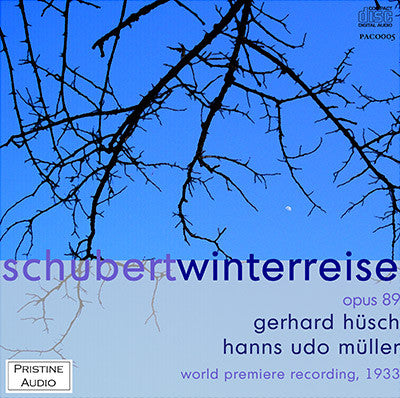
This album is included in the following sets:
This set contains the following albums:
- Producer's Note
- Full Track Listing
- Cover Art
Schubert's masterful song cycle Winterreise
Première recording from 1933 in superb sound quality
Often regarded as perhaps the greatest song cycle ever written, we're
delighted to present the world première recording, newly remastered by
Andrew Rose from immaculate 78rpm discs.
This classic
interpretation remained in the HMV catalogue for over 20 years and was
regarded as definitive. It is almost complete - there is a verse omitted
from Gute Nacht to enable it to fit onto a 78 rpm side - and the
standard of recording almost matches the standard of musical artistry.
To
come across a set of this vintage and to be able to bring out such a
wonderful sound is one of the great privileges of doing this kind of
work - since its completion this is one recording which has remained
constantly on my listening list - the beauty of Schubert's bleak
melancholy so magically captured by Gerhard Hüsch and Hans Udo Müller is
one to return to over and over.
Between 1925 and 1945 Gerhard
Hüsch was a regular star of the operatic stage, making his debut at
Liberau in Lortzing’s Der Waffenschmied in Osnabrück. He was also one of
the most admired singers of Lieder of the 1930's - as this recording
demonstrates, this admiration was wholly justified. After his
retirement, Hüsch made a second outstanding career as a master teacher
of vocal interpretations, latterly also in London.
This
recording was originally issued as a limited edition by HMV, listed
under their Society sets, and was followed a years later by a recording
of Die Schöne Müllerin, which we offer as PACO007.
Andrew Rose
-
SCHUBERT Winterreise
Duration: 65:38
Recorded in 1933, issued as 9 HMV 78s DB2039-2044 & DA1344-1346
Matrix Numbers: 32-4036.2D1627-II, 32-4010.2D1628-I, 30-11148.0B6497-II, 32-4048.2D1636-I, 32-4011.2D1631-I, 30-11149.0D1630-II, 32-4049.2D1627-II, 30-11150.0B6502-II, 32-4012.1626-II, 30-11151.0B6506-I,32-4013.2B6503-II, 32-4014.2B6505-I,32-4015.2B6507-I, 30-11152.0D1629-II, 32-4016.2B6509-I, 32-4017.2B6510-1, 32-4018.2D1639-II, 30-11153.0D1638-II
Gerhard Hüsch, baritone
Hanns Udo Müller, piano
Bill Rosen's Review
In this marvelous restoration he and his pianist present a very rare balance of beauty and musicianship that brings life to this transcendent song cycle
Although Beethoven is generally credited with creating the first song
cycle ("And die Ferne Geliebte"), Schubert ennobled the genre with his
two masterpieces "Die Schöne Müllerin" and "Die Winterreise". In the
19th century only Schumann's "Dichterliebe" and "Frauenliebe und Leben"
competed with Schubert's works. The 20th century has been more
productive beginning with Mahler's towering "Das Lied von der Erde",
Janacek's "The Diary of One Who Disappeared", continuing with Frank
Martin's "Sech Monologue aus Jedermann" and the magnificent and nearly
unknown "The Love and Death of Cornet Christopher Rilke" and finally two
of Shostakovich's seminal works: the 14th symphony and the Suite on
Verses of Michelangelo.
But none of these successors to Die
Winterreise have managed to create for an entire hour a mood of such
intensity and despair. In the earlier and happier work (Müllerin), the
disappointed lover drowns himself in the everpresent babbling brook. In
Die Winterreise, the jilted would-be bridegroom already is ironically
leaving town in the first song and about to embark on an hour-long
leave-taking journey where the winter outside is as nothing compared to
the winter in his soul. There are moments of partial relief (Die
Lindenbaum), but the jouney leads to Der Leiermann, the Hurdy-Gurdy Man,
barefoot on the ice, in rags, who plays listlessly and gets no coppers
and moves on. The protagonist also has nowhere to go and nothing else to
do - a true winter of existential emptiness.
The singer of
Winterreise must maintain some variety within the overall tragic
framework. He must keep the protagonist's basic identity in spite of the
increasing mood swings toward the end of the cycle: the more than a
hint of suicide in Der Wegweiser ["One road I must travel by which no
one ever returned"] and the possible madness of Die Nebensonnen [The
Phantom Suns]. I have been an appreciative fan of Gerhardt Hüsch's
Winterreise for at least 20 years, but Pristine Audio has scrubbed the
grime of the decades from it and and both Hüsch and Müller emerge with
unsuspected brilliance and power and it seems as if I'm hearing them for
the first time. Hüsch has an incredibly pure, masculine and tender
voice. His taste is always very musical; he never shouts or growls or
croons, but he knows how to convey passion and sorrow. The piano playing
and piano sound is so gorgeous. 1933? It's hard to believe.
I'm
loath to mention highlights, but just a few: (1) the strong and stately
Der Lindenbaum, (2) the halting sadness of Wasserflut, (3) the excellent
limning of the rapidly changing moods of Frühlingstraum, (4) the simple
but ironic joy of Die Post, (5) the proto-suicidal Die Wegweiser, and
(6) the unsentimental, affecting final Die Leiermann.
To keep
myself calibrated, I listened to Frühlingstraum by four other great
singers: Fischer-Dieskau (1955), Hotter (1943), Haefliger (1985), and
Prey (1984). Fischer-Dieskau had all the artistry one expects, but his
voice lacked the beauty of Hüsch's. Hotter seemed too old and grim by
half. Haefliger was magnificent in his changes of timbre, but the
"whiteness" in his voice reduced the sensual pleasure. Prey's voice was
very beautiful and the closest to Hüsch's in sound and artistry. I will
not say that Gerhardt Hüsch is the greatest Winterreise singer of all,
but I can say that in this marvelous restoration he and his pianist
present a very rare balance of beauty and musicianship that brings life
to this transcendent song cycle.
Reviewer: Bill Rosen

